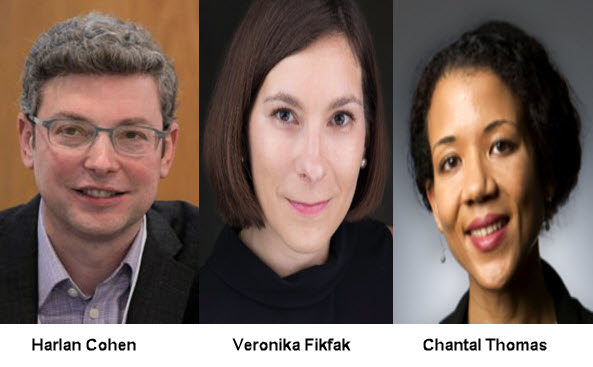Abstract
Excerpted From: Harlan Cohen, Veronika Fikfak and Chantal Thomas, Symposium on What Might International Law Repair?, 119 AJIL Unbound 124 (2025) (Full Document)
 To accompany the print edition of this issue of the American Journal of International Law, AJIL Unbound is publishing eleven essays across two Symposia on Reparations in International Law. These essays were selected from the call for essays published in June 2024, which generated more than 150 proposals. The large response from colleagues across the world--from Canada to South Africa, Kenya to Australia, United Kingdom to Zambia--and from early career researchers, established scholars, and practitioners in the field, demonstrates the enormous interest in the topic. It also underlines the changes in the field that have brought calls for reparative justice to the fore. The proposals we received covered the fields of climate change and environmental harm, war reparations and sexual violence, slavery and reparations for historical wrongs, and many others. The selected proposals showcase examples of successful and unsuccessful domestic and international reparations efforts and the lessons we can learn from them. The authors also propose solutions and provide inspiration that other fora--courts or commissions--can experiment with in the future. The eleven essays are divided into two separate symposia: the first speaks to the underlying questions of who can seek reparations, what reparations should look like, and finally, how the process of reparations is operationalized, with a plurality of the essays focusing on the case of climate change. The second symposium showcases a number of additional case studies--from reparations for cholera in Haiti, repatriation of Native American cultural objects under U.S. law, to attempts to redress the atrocities committed against the Mau Mau veterans, to the Ogoni Community case in Niger Delta, and the settlement of Indian Residential Schools policy in Canada--while also foregrounding broad historical perspectives on the colonial past.
To accompany the print edition of this issue of the American Journal of International Law, AJIL Unbound is publishing eleven essays across two Symposia on Reparations in International Law. These essays were selected from the call for essays published in June 2024, which generated more than 150 proposals. The large response from colleagues across the world--from Canada to South Africa, Kenya to Australia, United Kingdom to Zambia--and from early career researchers, established scholars, and practitioners in the field, demonstrates the enormous interest in the topic. It also underlines the changes in the field that have brought calls for reparative justice to the fore. The proposals we received covered the fields of climate change and environmental harm, war reparations and sexual violence, slavery and reparations for historical wrongs, and many others. The selected proposals showcase examples of successful and unsuccessful domestic and international reparations efforts and the lessons we can learn from them. The authors also propose solutions and provide inspiration that other fora--courts or commissions--can experiment with in the future. The eleven essays are divided into two separate symposia: the first speaks to the underlying questions of who can seek reparations, what reparations should look like, and finally, how the process of reparations is operationalized, with a plurality of the essays focusing on the case of climate change. The second symposium showcases a number of additional case studies--from reparations for cholera in Haiti, repatriation of Native American cultural objects under U.S. law, to attempts to redress the atrocities committed against the Mau Mau veterans, to the Ogoni Community case in Niger Delta, and the settlement of Indian Residential Schools policy in Canada--while also foregrounding broad historical perspectives on the colonial past.
As the essays in the print issue underscore, reparations represent a serious challenge for international law. The difficulty finding fair and consistent means of repairing injustices highlights the potential limits of international law itself, challenging our expectations of what international law can achieve and challenging us to imagine how international law might do more. Answering questions about reparations is an effort at soul-searching for the field. The selected essays in this Symposium complement the print issue by focusing on three particularly difficult threshold questions.
First, the essays ask who can claim reparations. In principle, reparations are intended to redress the harm caused to the injured party and to restore--as far as possible--the original condition, to secure restitutio in integrum. But who can claim to be the “injured” party under international law? In the context of climate change, our authors contrast claims made by vulnerable individuals and fossil fuel companies, victims of harm and actors that perpetuated the harm, and the emergence of justiciability for claims made on behalf of the earth itself.
[. . .]
Together, these six essays tackle the most recent developments across the world in the field of reparations. They challenge several aspects of the traditionally established idea that reparations are intended to redress the immediate victim's harm: first, by wrestling with who should benefit from reparations--from victims of harm to actors perpetuating harm, to mother Earth and communities inextricably connected with it; second, by expanding what reparations should look like--from buyouts to community led-reparations and reparations reestablishing harmony between the injured party and the territory it belongs to; and finally, by asking how and where reparations can be effectively secured--whether through increasingly similar approaches to determining compensation or in especially created claims commissions. In the end, these contributions help tease apart the hard questions that will need to be answered as international law confronts its obligations to help repair past harm and support global justice. A more just international law will require hard choices and hard work. These essays help light the path forward.
Harlan Cohen, Professor of Law, Fordham Law School, New York, United States.
Veronika Fikfak, Professor of Human Rights and International Law, University College London, UK.
Chantal Thomas, Vice Dean and Radice Family Professor of Law, Cornell Law School, New York, United States.


